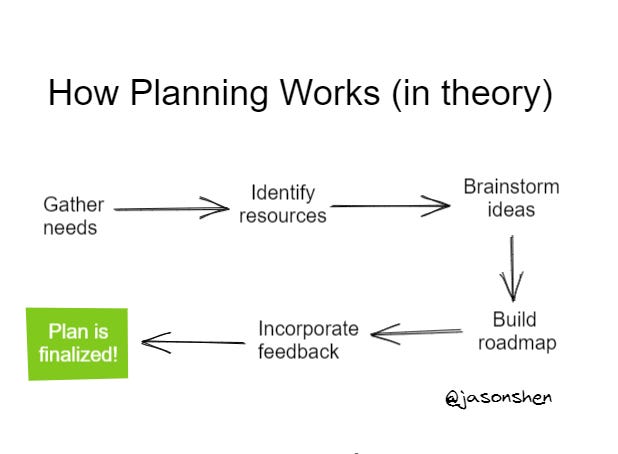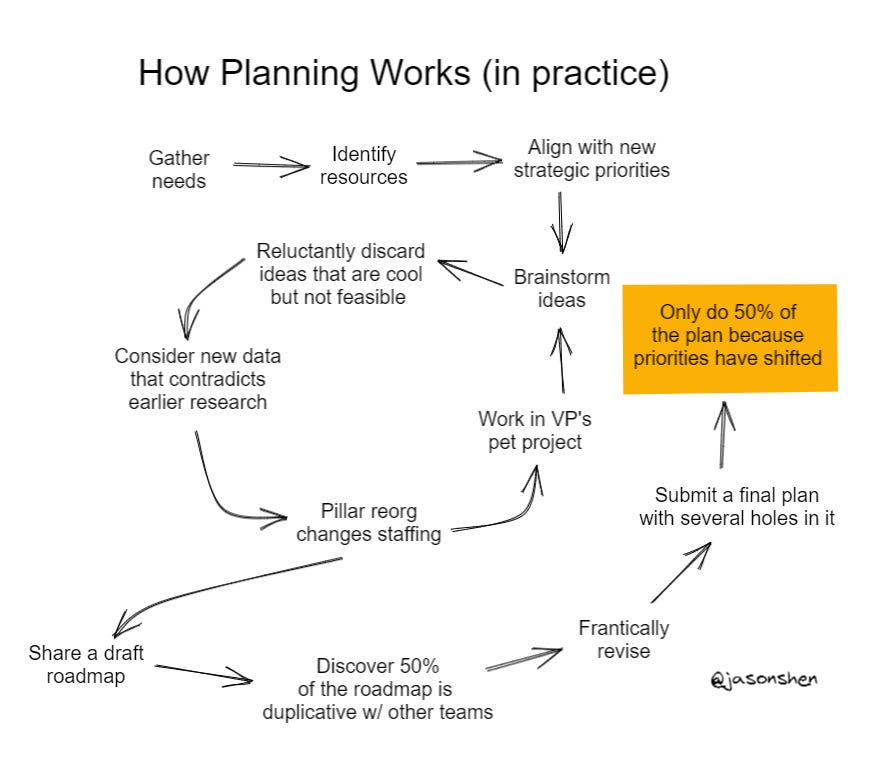#030: Planning (Theory vs Practice)
How Planning Works | Michael J Fox on Resilience | A Chinese Card Game
Dear friends,
This is the 30th edition of Making Connections, where we take a random (illustrated) walk down tech, fitness, product thinking, org design, nerd culture, persuasion, and behavior change.
I’ve seen an uptick in new subscribers of late, which I think may be driven by Substack’s new “find writers that you follow on Twitter” feature. Thanks for clicking down the Jason’s content rabbit hole =)
And if you’re reading this after being sent from a friend (they’ve got taste!) why not subscribe and join in the fun?
🖼 Visual: How Planning Works (Theory vs Practice)
I’m in the middle of a bunch of 2021 planning and reflecting on how that process should work in theory and actually works in practice is on my mind. This framework may or may not come from personal experience.
🧠 Thought: Michael J. Fox on Resilience
Michael J. Fox is probably the most widely-recognized Parkinson’s patient in the world. He stopped acting decades ago and has been focused on raising awareness and funds to treat and cure the disease. Known for being an optimist, his fourth memoir No Time Like the Future is more sobering, as I learned in a recent NYTimes interview.
Fox is 59 years old and after having a benign tumor removed from his spine earlier this year, required wheelchair assistance when traveling. This was not an empowering experience and I reflect on how often when people are hurt or vulnerable, they often lash out in other ways.
“It can be a frustrating and isolating experience, allowing someone else to determine the direction I’m going and the rate of speed I can travel. The pusher is in charge,” Fox writes. “From the point of view of the occupant of the chair, it’s a world of asses and elbows. No one can hear me. To compensate, I raise my voice and suddenly feel like Joan Crawford in ‘What Ever Happened to Baby Jane?,’ barking out orders.”
In 2002, he did a interview with the Times for his second memoir, Lucky Man, when he was a much younger man and far more optimistic about his Foundation’s ability to effect change.
A. In 1998, after I made my disclosure about Parkinson's, I went down and spoke to a Senate subcommittee, and I started to meet people in the scientific community. Naturally, my question was, Well, we're asking for money, what would we spend it on?
And they said, Oh, there's no end. This is the quintessential case of the science being way ahead of the money. And so in talking to Joan Samuelson [director of the Parkinson's Action Network], we just kind of came of this idea of this guerrilla organization that was bound by no convention. It was bound by no existing alliances. It only had one goal -- which was to take this declaration that I heard from a few scientists: that a cure was possible within a decade -- and make that our mantra. Let's say our deal is to be out of business within 10 years.
As a startup founder, I knew it was part of my job to make bold predictions about the future of my field and my company’s role it. It is the burden of the older and wiser folks to see their bold predictions fall short (and having raised over $1 billion for research, a lack of funds cannot be blamed for the failure!)
Fox writes, “Have I been an honest broker with the Parkinson’s community? The understanding I’ve reached with Parkinson’s is sincere, but the expression of it risks being glib.” He used to be a believer in making lemonade out of lemons, but now, he writes, “Screw it — I’m out of the lemonade business.”
Fox says that his message is about saying “It’s going to be OK - and it might suck!” Not the most upbeat message but I find some comfort in it nonetheless. Often our suffering is not in our momentary troubles, but our inability to imagine living with something this awful indefinitely.
The fact is, we CAN endure and even be happy while dealing with things that suck. And that’s never been more true.
👉 Check out: Zhao Peng You (Chinese Card Game)
I’m with my family for Thanksgiving. It’s 5 of us, and all the young people have negative COVID tests so it feels pretty safe. One of our family traditions is to play cards together. There’s a game we play called Zheng Shang You which is very similar to Asshole or President. But there’s a more complicated game I’ve heard about for years called Zhao Peng You “Looking for Friends” which requires 5 or more players.
I finally learned and started playing the game over the last few days and it’s a blast. It requires some explanation and some trial runs to really work out the rules, but it’s one of the better trick-taking card game to play with larger groups of people.
One of the most interesting elements of the game is that temporary alliances are formed during the game, which are established through play and not known at the start, giving early a play an air of mystery, while later play is more competitive and sports-team like.
I found exactly one video on YouTube about the game but luckily it does a pretty good job of explaining the basics, and there are more comprehensive instructions on Pagat.
🕵️ Who the heck is this Jason guy anyway?
This is a new section and a work in progress, but here’s a quick bio on me for those that stumble across this newsletter with little context:
Jason is a veteran technologist who wants to rewire our most important algorithms: the ones inside our heads. As a serial founder, his companies were backed Y Combinator, Techstars, and Betaworks. As an operator, he’s built products and led teams at Facebook, Etsy, and the Smithsonian. Jason shares his expertise on resilience, talent, and organizational culture in publications like Vox, Quartz, Fast Company, and in a TED talk with over 4M views. A former NCAA gymnastics champion, Jason lives in Brooklyn with his wife, two kettlebells, and many large stacks of books.
Stay warm and stay safe and I’ll catch you next Saturday!
-Jason





